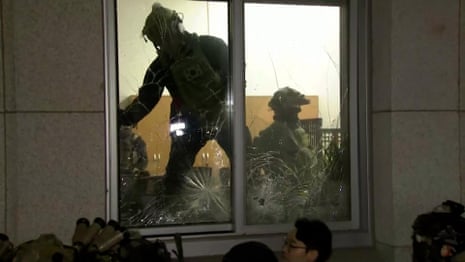In making an attempt to declare martial regulation, South Korea’s president, Yoon Suk Yeol, sought to awaken ghosts that the remainder of the nation thought had been laid to relaxation for good.
The final time martial regulation was declared, in 1980, tons of of individuals had been killed by the army dictator Chun Doo-hwan, who despatched protesters to a focus camp for “purificatory education”.
In the midst of his meteoric rise to energy from prosecutor to president, Yoon outraged a lot of the nation by making complimentary remarks about Chun, claiming three years in the past that many individuals thought the final had completed effectively in politics other than his coup and the crushing of protests.
Yoon, a lawyer and political neophyte, was compelled to subject an apology and visited the memorial in Gwangju to the most important bloodbath of the Chun period, however a lot of his critics had been sceptical concerning the sincerity of his retraction.
They had been additionally alarmed by Yoon’s promotion to senior positions of members of the nation’s New Proper Motion, which mixes a dedication to free market economics with a revisionist view of the Japanese colonial period and its earlier intervals of dictatorship.
Yoon’s short-lived declaration of martial regulation seems to have been a determined gamble within the face of rock-bottom public reputation – with optimistic scores barely over 10% – within the midst of a medical doctors’ strike and staunch political opposition, more and more together with his personal Folks Energy celebration, whose chief, Han Dong-hoon, mentioned the transfer was a “wrong move”.
Yoon could have thought that his nostalgia for authoritarianism would resonate with at the least among the South Korean political spectrum, however the unanimous vote within the nationwide meeting to overturn his declaration, together with by his personal celebration, suggests he miscalculated. Inside hours, he was compelled to again down, and martial regulation was formally lifted after a cupboard assembly.
John Nilsson-Wright, the pinnacle of Cambridge College’s Japan and Koreas programme, mentioned: “The fact that he’s acted this way I don’t think really reflects any strong nostalgia on the part of the right for the authoritarian style of leadership. I think it’s a reflection of Yoon’s personality.
“The political momentum was already seeping away from the president, which may be why he decided to act in this way. But it was a foolhardy and deeply misguided decision, and I suspect it will have backfired, if the early indicators are anything to go by.”
The unknown amount is the army. After forces had been despatched in to the meeting, there have been reviews on Tuesday that at the least a few of these troops had been being withdrawn, although the army management reportedly introduced that it might keep martial regulation till it was informed in any other case.
The military chief of workers, Gen Park An-su, declared a ban on all political actions and the imposition of army management on “all news media and publications”, however these declarations had been totally ignored. The nationwide meeting was in ferment, the streets stuffed with protesters and Korea’s sturdy information organisations continued to report occasions as they unfolded.
It’s unclear how whether or not Park’s preliminary pronouncements arose from sheer uncertainty concerning the constitutional legality of such an unprecedented scenario or real enthusiasm for a coup. In his late evening tackle, Yoon mentioned that troops would return to their barracks, however traditionally, armies which have tasted political energy are hardly ever totally cured of the bug.
Yoon’s invocation of a overseas risk, within the type of “North Korean communist forces” and their supposed sympathisers within the South, seem flimsy within the excessive, however carried with it the danger of turning into a self-fulfilling prophecy.
In Pyongyang, Kim Jong-un is having fun with a resurgence, rescued from full isolation by Vladimir Putin’s determined want for army support in Ukraine. It appears extremely doubtless that he’ll search to use Seoul’s hour of weak spot. Any aggressive transfer from the North may present retrospective justification for Yoon and the army.
“For a president who has focused so much on South Korea’s international reputation, this makes South Korea look very unstable,” Mason Richey, a professor at Hankuk College of International Research in Seoul informed Reuters. “This will have a negative effect on financial and currency markets and South Korea’s diplomatic place in the world.”




